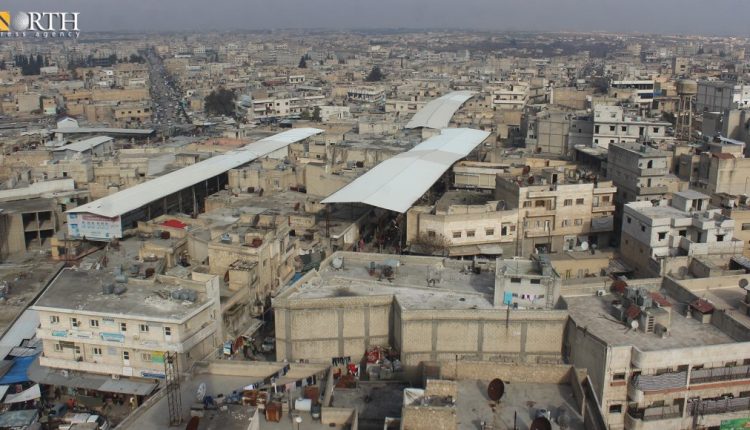MANBIJ, Syria (North Press) – Residents in the city of Manbij, northern Syria, believe the city’s location between three areas of control made it strategically important.
Manbij is located in the northern countryside of Aleppo, and has commercial crossings that connect areas run by the Autonomous Administration of North and East Syria (AANES), those controlled by the Syrian government forces, and those under the control of Turkish-backed armed opposition factions, aka the Syrian National Army (SNA).
Fahd Shalash, co-chair of Relations Office of the Future Syria Party in Manbij, said that the city has become the “Aleppo” of Northeast Syria, which was known as the commercial capital of Syria before the Syrian conflict.
The Syrian Democratic Forces (SDF) supported by the U.S.-led Global Coalition to Defeat ISIS liberated Manbij from ISIS in 2016 following fierce battles.
Following its liberation from the group, the local population, including Arabs, Kurds, Circassians and Turkmen, established their own administration to run the affairs of the region, which later joined the AANES.
Job opportunities
Shalash believes that city’s suitable location for trade improved living conditions through trade revenues and providing job opportunities for residents and IDPs.
Shalash told North Press that thousands of workers benefited from trade in Manbij, in addition to contributing to a boom in construction and real estate activities.
Sadrudein Hamedi, Deputy co-chair of AANES’ Trade Committee in Manbij, said that commercial activity in Manbij contributed to economic growth in general. However, Turkish threats and the closing of crossings are key challenges.
Hamedi points out the boom in the economy created job opportunities for shipping, loading and unloading workers, warehouse rentals, and long-distance commercial shipping which contributes to economic recovery.
Economic growth
Hamedi believes that AANES trade laws and monitoring markets helped boost economic growth in the city. He adds that so far the AANES’ Chamber of Commerce has granted over 1,000 registrations for medium and small shops and the Trade Directorate has issued 30 licenses for major traders importing basic materials.
Businessmen in Manbij import food, construction items, and raw materials essential for manufacturing, meanwhile exporting the agricultural surplus and livestock resources.
Commercial exchange
Abdulkarim Jalo, a merchant from Manbij, says commercial goods go in and out of the city on a daily basis through trade crossings and are exported to other cities in Northeast Syria.
Jalo adds commercial exchange reaches areas in the far northeast of Syria, where goods from Iraq enter Manbij via the city of Qamishli. Additionally, Turkish and European goods are shipped from Manbij to the cities of Kobani and Raqqa, and Hasakah.
Jalo says they faces obstacles in their business, including early closure of checkpoints within Northeast Syria, especially the bridge of Qaraqozaq checkpoint.
Jalo points out that the commercial movement in Manbij has significantly reduced unemployment in the city and has created job opportunities for machinery owners in Manbij and beyond to work in the field of commercial cargo shipping.
Jalo further explains that the commercial movement contributed to the increase in the number of markets in the city and its countryside. Previously, the city had only one market, but now more markets are seen in most neighborhoods of the city.

